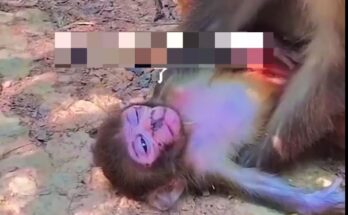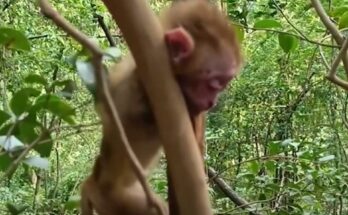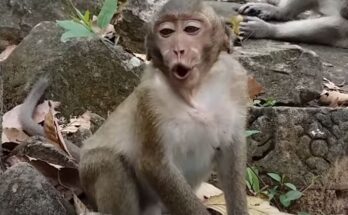Little monkeys that lack access to their mother’s milk face severe challenges in their development and survival. Mother’s milk is essential for infant monkeys, as it provides the critical nutrients, antibodies, and energy needed during the early stages of life. When deprived of this vital source, their bodies become extremely thin and weak, reflecting the profound impact of malnutrition on their physical and physiological well-being.
In the wild, a monkey’s survival is closely tied to the maternal bond. For the first few weeks or months of life, young monkeys rely entirely on their mother’s milk for nourishment. This milk contains a perfect blend of proteins, fats, vitamins, and minerals tailored to meet the infant’s needs. Moreover, it delivers immune-boosting antibodies that protect the baby from diseases and infections common in their environment. Without this nourishment, their immune systems are compromised, making them more susceptible to illnesses.
The lack of proper nutrition affects not only their physical appearance but also their internal development. Thin and weak bodies indicate that these young monkeys are not getting enough energy to sustain normal growth. Critical organs, including the brain and heart, may not develop properly, leading to long-term health complications. Muscle development is stunted, leaving them less agile and less capable of escaping predators or competing for resources as they grow.
In addition to physical health, the absence of a nurturing bond with the mother can lead to psychological stress. Monkeys are highly social animals, and the mother-infant relationship is a cornerstone of their social development. The deprivation of this bond can result in heightened anxiety, behavioral issues, and difficulty integrating into social groups later in life. This social isolation can further exacerbate their vulnerability in the wild.
There are several reasons why infant monkeys might lack access to their mother’s milk. It could be due to maternal death, illness, or abandonment, or even environmental pressures such as habitat destruction and human interference. Orphaned monkeys are particularly at risk, as they lose both their primary caregiver and their best source of nutrition.
Conservationists and wildlife rehabilitation centers often step in to provide care for orphaned monkeys. They may use specialized milk formulas designed to mimic the nutritional content of natural milk, helping these vulnerable creatures recover and regain strength. However, the emotional and social aspects of maternal care remain irreplaceable, highlighting the profound importance of a mother’s presence in the early lives of these primate


